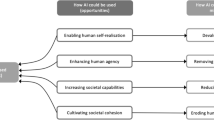Abstract
In this paper, we discuss the ethical implications of AI applications in the Latin American context, focusing on the particular challenges relevant to the region. Although awareness of the ethical issues associated with AI has been increasing, the issues in Latin America are compounded by locally relevant concerns associated with the power differential between the developers of AI applications and the Latin American users; the lack of access to education in general, which restricts access to information about the actual capabilities and limitations of AI systems; and the relatively low importance of the voices and cultural patterns of communities that are culturally distinct from other settings in the Global South (e.g., overgeneralizing understandings of Latin America as similar to Africa or Asia). In this work, we present three general categories of ethical issues classified according to their association with the extent of understanding of AI and how it is trained, and to their societal impacts across Latin American societies. We highlight the need to further understand the challenges relevant to the region, which can serve as a reference for future conversations with diverse and underrepresented communities.
Similar content being viewed by others
Data Availability
We do not analyze or generate any datasets, because our work proceeds within a theoretical approach.
Materials and/or Code Availability
Not applicable.
References
Adams, G., & Markus, H. R. (2004). Toward a conception of culture suitable for a social psychology of culture. The psychological foundations of culture, (pp. 335–360).
Alvarado, R. (2022). Should we replace radiologists with deep learning? Pigeons, error and trust in medical AI. Bioethics, 36, 121–133.
Buolamwini, J., & Gebru, T. (2018). Gender shades: Intersectional accuracy disparities in commercial gender classification. In Conference on fairness, accountability and transparency (pp. 77–91). PMLR.
Chopra, A. K., & Singh, M. P. (2018). Sociotechnical systems and ethics in the large. In Proceedings of the 2018 AAAI/ACM Conference on AI, Ethics, and Society (pp. 48–53).
Escobar, A. (2007). Worlds and knowledges otherwise: The Latin American modernity/coloniality research program. Cultural Studies, 21, 179–210.
Eubanks, V. (2018). Automating inequality: How high-tech tools profile, police, and punish the poor. New York, NY, USA: St. Martin’s Press.
Gómez, C., May, C., Martínez, C., Martín, A., & Minds, C. (2020). Artificial intelligence for social good in Latin America and the Caribbean: The regional landscape and 12 country snapshots. Banco Interamericano de Desarrollo/Inter-American Development Bank: Washington, DC, USA.
INE. (2018). XII Censo Nacional de Poblacion y VII de Vivienda - 2018. Guatemala, Guatemala.
Kwet, M. (2019). Digital colonialism: US empire and the new imperialism in the Global South. Race & Class, 60, 3–26.
Maldonado-Torres, N. (2007). On the coloniality of being: Contributions to the development of a concept. Cultural Studies, 21, 240–270.
Mignolo, W. D. (2011). The darker side of Western modernity. Durham, NC, USA: Duke University Press.
Mohamed, S., Png, M.-T., & Isaac, W. (2020). Decolonial AI: Decolonial theory as sociotechnical foresight in artificial intelligence. Philosophy & Technology, 33, 659–684.
Noble, S. U. (2018). Algorithms of oppression. New York, NY, USA: New York University Press.
Obermeyer, Z., Powers, B., Vogeli, C., & Mullainathan, S. (2019). Dissecting racial bias in an algorithm used to manage the health of populations. Science, 366, 447–453.
OECD, for Latin America, E. C., The Caribbean, of Latin America, C. D. B., & Commission, E. (2021). Latin American Economic Outlook 2021.
OECD/CAF. (2022). The strategic and responsible use of artificial intelligence in the public sector of Latin America and the Caribbean. OECD Public Governance Reviews.
O’neil, C. (2016). Weapons of math destruction: How big data increases inequality and threatens democracy. Portland, OR, USA: Broadway Books.
Quijano, A. (2000). Coloniality of power and eurocentrism in Latin America. International Sociology, 15, 215–232.
Savage, N. (2020). The race to the top among the world’s leaders in artificial intelligence. Nature, 588, S102–S102.
Tsamados, A., Aggarwal, N., Cowls, J., Morley, J., Roberts, H., Taddeo, M., & Floridi, L. (2022). The ethics of algorithms: Key problems and solutions. AI & SOCIETY, 37, 215–230.
Tomašev, N., Cornebise, J., Hutter, F., Mohamed, S., Picciariello, A., Connelly, B., Belgrave, D., Ezer, D., Haert, F. C., Mugisha, F., et al. (2020). AI for social good: Unlocking the opportunity for positive impact. Nature Communications, 11, 1–6.
UNICEF. (2020). Sao Paulo Consultation Workshop Report, AI and children in Latin America and the Caribbean. New York, NY, USA: Office of Global Insight and Policy.
Vakkuri, V., Kemell, K.-K., Jantunen, M., & Abrahamsson, P. (2020). “This is just a prototype”: How ethics are ignored in software startup-like environments. In V. Stray, R. Hoda, M. Paasivaara, & P. Kruchten (Eds.), Agile Processes in Software Engineering and Extreme Programming (pp. 195–210). Cham: Springer International Publishing.
Wall, P., Saxena, D., & Brown, S. (2021). Artificial intelligence in the Global South (AI4D): Potential and risks. arXiv preprint arXiv:2108.10093.
Funding
The authors have no competing interests to declare that are relevant to the content of this article.
Author information
Authors and Affiliations
Contributions
All authors contributed to the study conception, design, and material preparation. All wrote and commented on the different versions of the manuscript and read and approved the final manuscript.
Corresponding author
Ethics declarations
Ethics Approval
Not applicable.
Informed Consent
All authors consent and approve of the content of this manuscript. There was no involvement of humans or animals during the research, so informed consent of participants is not applicable.
Competing Interests
The authors declare no competing interests.
Rights and permissions
Springer Nature or its licensor holds exclusive rights to this article under a publishing agreement with the author(s) or other rightsholder(s); author self-archiving of the accepted manuscript version of this article is solely governed by the terms of such publishing agreement and applicable law.
About this article
Cite this article
Mancilla-Caceres, J.F., Estrada-Villalta, S. The Ethical Considerations of AI in Latin America. DISO 1, 16 (2022). https://doi.org/10.1007/s44206-022-00018-y
Received:
Accepted:
Published:
DOI: https://doi.org/10.1007/s44206-022-00018-y




